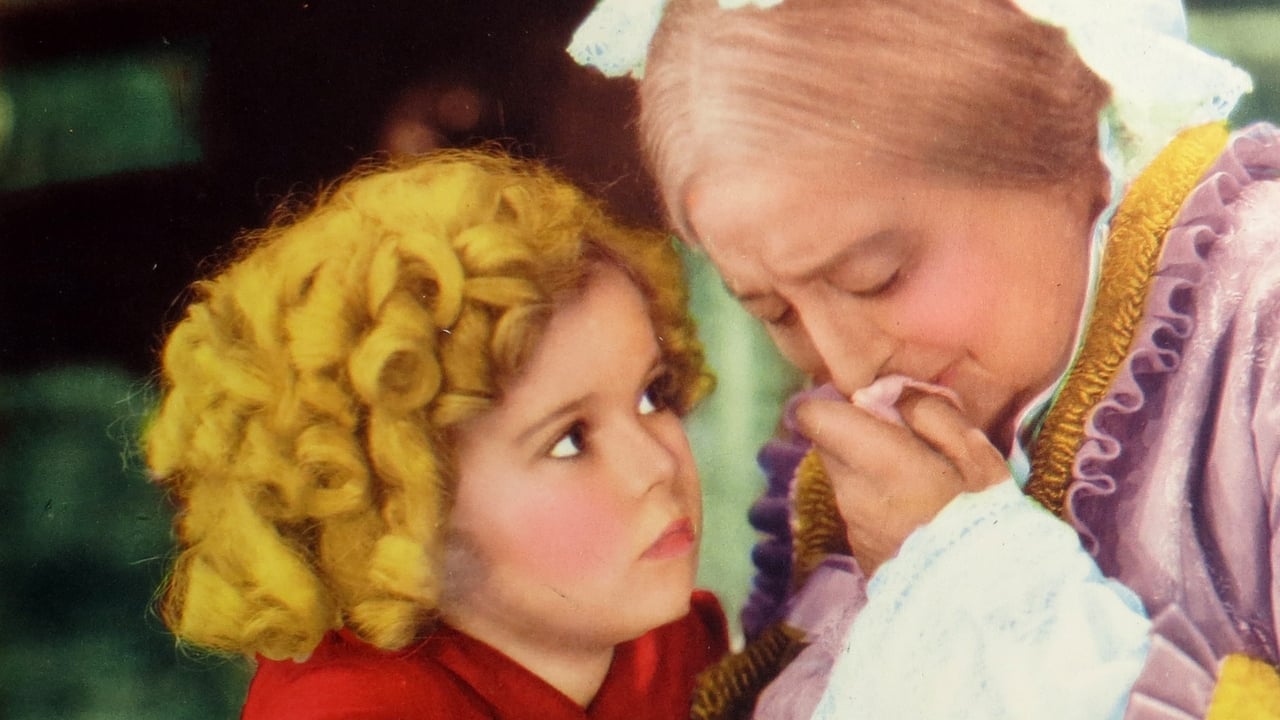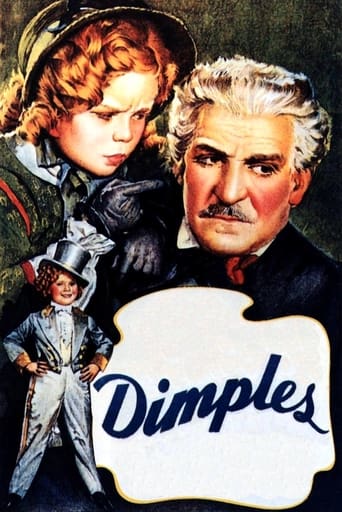

For a wide variety of reasons, "Dimples" is among the poorest of Shirley Temple's full-length films. The characters are often quite unlikeable and there are MANY segments that simply made me cringe due to the film's racial insensitivity.Dimples (Temple) lives with her no-good grandfather (Frank Morgan). Grandpa makes his living cheating people and picking pockets--yet somehow we are expected to somehow care about him. An old lady (Helen Westley) thinks Dimples is simply adorable (as did all of America in 1936) and wants to buy her from Grandpa! Now Grandpa tries to change his evil ways and care for her but he soon loses Allen Drew's money he entrusted to him and ends up considering the old lady's offer! In the meantime, there is a show to put on--and seeing all the black-faced folks putting on a minstrel show is quite a treat! And, it's sure to cause some viewers to have heart attacks.While the minstrels and the addition of Stepin Fetchit are NOT unique to this Temple film (in "The Littlest Rebel" Shirley herself is in black-face and Willie Best does his best Fetchit imitation), it's made worse by a cast of characters you simply cannot like. All in all, a clear misfire by the studio and a far from satisfying family film.
... View MoreShirley Temple plays a singing, dancing street urchin in 1850 New York City whose multi-racial music troupe is managed by her pickpocket grandfather (he uses the kids as ruse for robbery); when a rich matron takes kindly to the youngster, the wily grandpa has to decide whether to sell the child for five grand (in the hopes she'll have a better life) or continue living happily together in squalor. Not-bad star vehicle allows Shirley to be more sly and precocious than in some of her other pictures. She stumbles over big words (like 'peneteniary') which seems out of character, though her scene with Mrs. Drew returning a stolen clock is funny ("I'm so wicked, I don't know what's to become of me."). Temple was always goaded into acting like a wise-beyond-her-years wind-up doll, but here she has a more distinct personality, and the director gives her time to think things through. She's still far too choreographed (in both her acting and dancing), but her responses seem pretty fresh, and matching her with Frank Morgan was a good casting move (they play off each other warmly). Interesting subtext about racial equality, as well as some clever material aligning the desperation of 1850 with Depression-era audiences circa 1936. **1/2 from ****
... View MoreDIMPLES (20th Century-Fox, 1936), directed by William A. Seiter, marks the third movie with a title depicting on Shirley Temple's trademark features, following BRIGHT EYES (1934) and CURLY TOP (1935). It also marked the return of the bright-eyed, curly-top, dimpled-child star to 19th Century America, having already won her own Civil War as THE LITTLEST REBEL, and taken charge in post Civil War as THE LITTLE COLONEL. While these 1935 classics featured the legendary dancer Bill Robinson, DIMPLES, which goes further back in time, New York City circa 1850, it credits him only as choreographer to Temple's dance numbers, which are in many ways, first rate.With the opening of a sign reading: "Vote for (Franklin) Pierce in 1850 so he can end the Depression by 1852," the story gets underway with the introduction of Dimples (Shirley Temple), a talented child helping her grandfather, Professor Eustace Appleby (Frank Morgan) to earn extra money by singing and dancing on the street corners of the Bowery along with other urchins of an all kids band. With her grandfather being an unemployed actor, Dimples, who looks up to him as a man of honesty, is unaware that he's a petty thief who picks pockets while she sings and dances to the crowd. The Professor arranges for the children to entertain uptown in the home of the wealthy Caroline Drew (Helen Westley) during an engagement party of her nephew, Allen (Robert Kent) and his fiancé, Betty Loring (Delma Byron). As Dimples performs, the Professor breaks away to steal some articles from Mrs. Drew. Realizing the other kids are right about her grandfather being a thief, Dimples saves him from disgrace by assuming the blame of a stolen cuckoo clock to Mrs. Drew. Because Mrs. Drew is lonely, especially after losing her nephew to the theater (with Allen wanting Dimples to play the lead in his upcoming production of "Uncle Tom's Cabin"), and his association with an Cleo Marsh (Astrid Allwyn), an actress, she decides to bring some life into her empty mansion by offering the Professor $5,000 to have Dimples live with her. While this brings some joy and happiness to the dowager, it brings sadness and emptiness to the child who wants nothing more than to be with her grandfather again.In its own little way, DIMPLES resembles POPPY (Paramount, 1936), starring W.C. Fields (reprising his Broadway role as Eustace McGargle) and Rochelle Hudson. With both stories set in the 19th century, Frank Morgan, on loan from MGM, enacts his role almost in the Fields manner. Aside from being middle-aged and addressed as "Professor," they are both father and mother to a female orphan who truly loves them, in spite of their weakness of lying and stealing. Both men make the supreme sacrifice by leaving their loved one in the care of a rich widow who can better provide for them with a brighter future. Morgan's character at one point gets taken in by some thieves (one of them played by John Carradine) in Central Park by purchasing a valuable watch that "Josephine gave to Napoleon" with the $800 entrusted to him by Allen. Discovering the watch to be worthless, he sells the "family heirloom" to Mrs. Drew for $1,000. To avoid being arrested, the Professor hides in the theater by blackening his face where he is mistaken for the real actor (Jack Clifford) playing "Uncle Tom." While Morgan does a commendable job all around, how interesting DIMPLES might have been with W.C. Fields instead of Morgan opposite Temple. While POPPY and DIMPLES mix sentiment with comedy, DIMPLES provides more musical numbers than POPPY. Songs for this production composed by Jimmy McHugh and Ted Koehler include "What Did the Bluebird Say?" "He Was a Dandy," "Picture Me Without You" (all sung by Shirley Temple); "Get on Board" "Sweet Low, Sweet Chariot" (sung by the Hall Johnson Choir during the "Uncle Tom's Cabin" play); and "Dixie-Ana" (performed by Temple and minstrels).While DIMPLES recaptures the bygone era of minstrel shows and the re-enactment of noteworthy scenes taken from Harriet Beecher Stowe's classic novel "Uncle Tom's Cabin" during the theater segment with Dimples playing Little Eva, certain areas of the story suffer from slow pacing. The young romantic leads (Kent and Byron) are lifeless while the older players (Morgan and Westley) prove satisfactory. Without the presence of Temple and her ability to bring life to the story through her singing and dancing, DIMPLES might have been a total failure. Temple's singing of "Picture Me Without You" to Morgan comes across a little trite or corny, while "Dixie-Ana" is agreeable enough to rank this one of her finest dance numbers captured on film.Others members of the cast include Berton Churchill, Paul Stanton and Betty Jean Haines as "Topsy" in the "Uncle Tom's Cabin" segment. While it's been customary for resident 20th-Fox black comedian Stepin Fetchit to receive special billing in the cast, in DIMPLES his performance as Cicero, mysteriously goes without any screen credit in most prints, receives fifth billing in closing credits in others.Available on video cassette and DVD for any Temple fan to enjoy in both black and white and colorized formats, DIMPLES was presented over the years on several cable TV networks ranging from The Disney Channel (1980s-90s), American Movie Classics (1996-2000) and presently on the Fox Movie Channel. (**1/2)
... View MoreWhat a charming musical! Shirley Temple is absolutely adorable. I love when she sings "Get on Board" as Eva in Uncle Tom's Cabin. Her character is dressed in white. I love plenty of song and dance. It does not make me tired at all. What it does, is make me so very happy. The title alone, Dimples, is very charming. Shirley Temple herself as a child has had what the title says. That was for quite a long time. I have been very glad of that. It is a very old movie, but then again I like old ones. Whatever age you are, it is a must that you like good movies. This especially holds true for most of Temple's films. They are absolutely irresistible. Maybe someday I'll put on a song-and-dance myself. Who knows? The number "Miss Dixie-Anna" at the end makes it a great movie. Would I dare to say anything else about the ending? I really don't know for sure. No one wants to know that in advance. They want to see for themselves, thank you. Please let everyone enjoy this really good vehicle of Little Miss Temple.
... View More